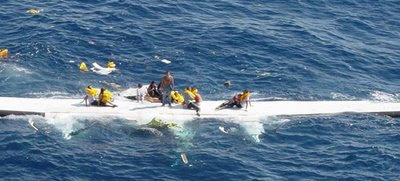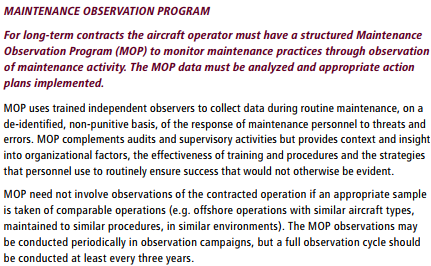Fuel System Maintenance Error: Tuniter ATR72 TS-LBB Ditching 6 August 2005
On the 6 August 2005 a Tuninter ATR72 turboprop aircraft, TS-LBB, flying from Bari, Italy to Tunis, Tunisia, ran out of fuel and ditched off the northern coast of Sicily. Of the 39 people on board, 16 died.
The aircraft had been erroneously fitted during maintenance with the Fuel Quantity Indicator (FQI) for the smaller ATR42. The ATR72 FQI was not found in the stores because its part number had been entered into the stores database without the integral ‘dashes’ and the database mistakenly indicated that the ATR42 part, which was found in the database, was compatible with both aircraft types.
With the wrong FQI, the quantity displayed exceeded the actual fuel. When fuelled, the difference between the expected fuel and that indicated was not initially noticed. When it was, it was incorrectly believed that a further fuelling had taken place and the records misplaced.
When the engines flamed out the crew did not feather the propellers to reduce drag as they were attempting to restart the engines, believing fuel remained (as indicated by the FQI). Consequently they did not fly the aircraft at the optimum speed to extend the gliding distance.
This was a classic ‘organisational accident’ unfortunately the a number of individuals were prosecuted. There was also considerable condemnation over the use of the CVR by the prosecutors.
The full Agenzia Nazionale per la Sicurezza del Volo (ANSV) report is here and an separate academic paper here. An Airworthiness Directive was issued: F-2005-160
In 2009 the Flight Safety Foundation (FSF) published this useful summary: False Positive
The FAA Lessons Learnt Database contains three fuel exhaustion case studies:
| Title | Description | Date |
|---|---|---|
| UAL Flight 173 near Portland | On December 28, 1978 a McDonnell Douglas DC-8-61 turbofan powered airplane operated by United Airlines and registered as N8082U, crashed into a wooded suburban area while on approach to Portland International Airport, Portland, Oregon. …more | December 28, 1978 |
| Avianca Airlines B707 Flight 52 at Long Island, NY | Avianca Airlines Flight 052, a Boeing 707-321B, was a scheduled international flight from Bogota, Colombia, to John F. Kennedy (JFK) International Airport, New York. Poor weather conditions in the Northeast of the US led to the flight being put in …more | January 25,1990 |
| Air Transat A330 Flight TSC236 at Terceira Airport, Azores | On August 24, 2001, Air Transat Flight TSC236, an Airbus Model 330-243 aircraft, was on a scheduled flight from Toronto, Canada to Lisbon, Portugal. A fuel leak in the Number 2 (right) engine began three hours 46 minutes into the flight that was …more | August 24, 2001 |
Safety Resources
See also:
- B1900D Emergency Landing: Maintenance Standards & Practices
- Airworthiness Matters: Next Generation Maintenance Human Factors
- Rockets Sleds, Steamships and Human Factors: Murphy’s Law or Holt’s Law?
- Professor James Reason’s 12 Principles of Error Management
- Back to the Future: Error Management
Aerossurance has previously examined:
- Fuel Exhaustion Causes EMB-110 Emergency Landing
- Canadian KA100 Fuel Exhaustion Accident
- UPDATE 12 October 2019: ATR72 VH-FVR Missed Damage: Maintenance Lessons Unclear communications, shift handover & roles and responsibilities, complacency about fatigue and failure to use access equipment all feature in this serious incident.
- UPDATE 25 June 2020: Japanese Jetstar Boeing 787 GEnx-1B Engine Biocide Serious Incident
Aerossurance worked with the Flight Safety Foundation (FSF) to create a Maintenance Observation Program (MOP) requirement for their contractible BARSOHO offshore helicopter Safety Performance Requirements to help learning about routine maintenance and then to initiate safety improvements:
Aerossurance can provide practice guidance and specialist support to successfully implement a MOP, which fills a gap in maintenance that in operations is filled by FDM and LOSA.
Aerossurance sponsored the 2017 European Society of Air Safety Investigators (ESASI) 8th Regional Seminar in Ljubljana, Slovenia on 19 and 20 April 2017. ESASI is the European chapter of the International Society of Air Safety Investigators (ISASI).
Aerossurance is pleased to be supporting the annual Chartered Institute of Ergonomics & Human Factors’ (CIEHF) Human Factors in Aviation Safety Conference for the third year running. We will be presenting for the second year running too. This year the conference takes place 13 to 14 November 2017 at the Hilton London Gatwick Airport, UK with the theme: How do we improve human performance in today’s aviation business?
Aerossurance is pleased to be both sponsoring and presenting at a Royal Aeronautical Society (RAeS) Human Factors Group: Engineering seminar Maintenance Error: Are we learning? to be held on 9 May 2019 at Cranfield University.




Recent Comments